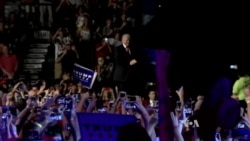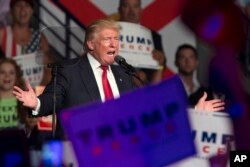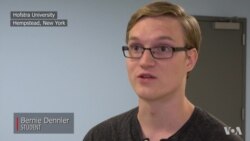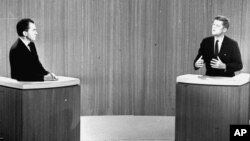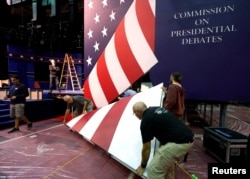It could be the defining moment of the 2016 campaign.
Monday’s first presidential debate between Democrat Hillary Clinton and Republican Donald Trump may draw, by some estimates, 100 million viewers, who will be able to take the measure of the candidates for the first time on the same stage together.
The stakes for both contenders are enormous. Viewers will not only be paying attention to what is said, but how it’s said and how the candidates react to one another.
Which Trump will show up?
The debate will be a key moment for Trump, who has closed the polling gap in recent weeks against Democrat Hillary Clinton in part because he has presented himself as more disciplined than he has in the past. He has also focused on his central theme:
“We will make America strong again. We will make America safe again, and we will make America great again!” Trump told supporters at a rally in Fort Myers, Florida, one of the critical swing states where he has drawn even with Clinton in recent polls.
For her part, Clinton looks to the debate to reassure her supporters and to push her message of wanting to build a more inclusive economy, as she did during a recent rally in Orlando, Florida. “We are all of value. In the United States of America, the greatest country in the world, we believe everyone is created equal!”
Intense scrutiny amid tightening polls
The first of the three debates, traditionally the most watched, comes at a potentially game-changing moment, said Matthew Dallek of George Washington University. “Right now the election is closer than a lot of people anticipated, and so it matters a great deal for both of them.”
WATCH: Young voters at Hostra University ahead of the debate
Televised presidential debates began in 1960 with Richard Nixon and John Kennedy. Since then, the debates have had an impact on some but not necessarily all presidential elections. “In a normal year, the debates are one of the only ways to move the needles after the conventions. They are the moment where more people tune in and watch,” said George Mason University associate professor of government Jeremy Mayer.
Prepare or just wing it?
Trump and Clinton appear to be prepping for the debates in different ways. Clinton has spent a lot of time in debate practice, including mock face-offs with surrogates portraying Trump.
Trump’s advance work has been reportedly less time-consuming and intense. He also took a swipe at Clinton during a rally in Pennsylvania. “Well, they say she has been practicing for the debate. Some people think she’s sleeping.”
Democrats hope a more reckless version of Trump shows up in the first debate, more in keeping with his past performances in some of the Republican primary debates. But Trump's new campaign staff seems to have had some success of late in keeping him focused and less distracted by the temptation of launching personal attacks.
Different audience
Both Trump and Clinton performed well in their respective party primary debates earlier this year. It is possible to argue that Trump won the Republican nomination by making the most of his debate performances and his slashing attacks on rivals like Jeb Bush, Marco Rubio and Ted Cruz.
But Trump will be playing to a different audience in the debates with Clinton. He will be seeking to improve his image with moderate Republican voters and undecided independents who likely won’t be swayed by the kind of partisan attacks he launched in the primary debates.
Clinton will also be able to call on her experience in the primary debates with her main challenger, Vermont Senator Bernie Sanders. Clinton generally was able to hold her own in a number of the debates with Sanders and often put him on the defensive by raising questions about the practicality of some of his proposals.
But Clinton has her challenges as well. Polls show a majority of voters don't trust her. The controversial way she handled questions about her use of a private email server while secretary of state continues to dog her in the final weeks of this election campaign.
Trump’s unpredictable nature also presents a challenge for Clinton as she prepares for the first debate, said Georgetown University’s Stephen Wayne. “The thing about Donald Trump is that he is not as disciplined as Hillary Clinton. If you get under Donald Trump’s skin, he is apt to react in a very personal way.
Opportunity and risk
Both contenders suffer from high disapproval ratings from voters, and the debates represent both opportunity and risk. “What a debate can do is give a candidate a second chance to make a different impression or cement a negative impression,” said Jeremy Mayer.
In recent years, presidential debates may have been less consequential to election outcomes than they were early on. “We can think of two presidential debates in American history, the first between [Democrat John] Kennedy and [Republican Richard] Nixon (1960) and the second between [Republican Gerald] Ford and [Democrat Jimmy] Carter (1976), where mistakes were made or appearances didn’t look right that seemed to have an impact on the outcome,” said Georgetown’s Stephen Wayne.
There will be a total of three presidential debates and one face-off between the two vice-presidential candidates, Democrat Tim Kaine and Republican Mike Pence.




